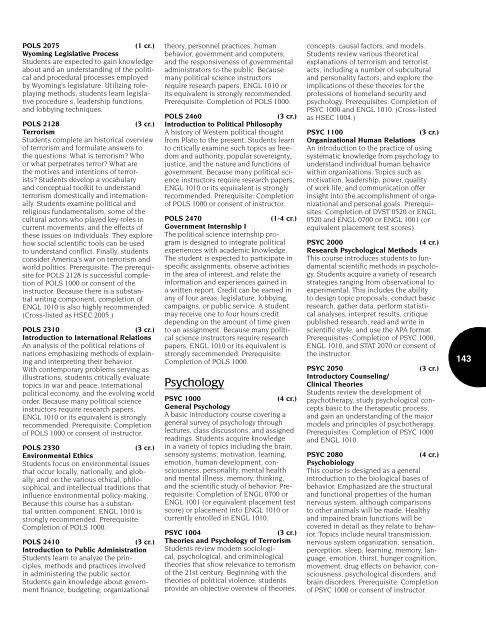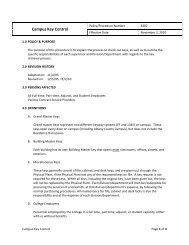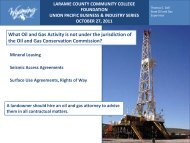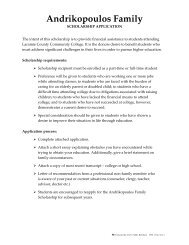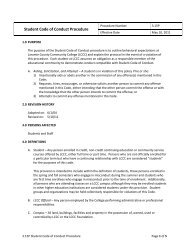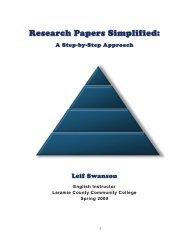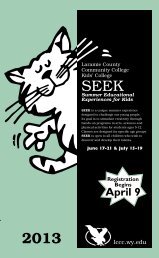LCCC policy - Laramie County Community College
LCCC policy - Laramie County Community College
LCCC policy - Laramie County Community College
You also want an ePaper? Increase the reach of your titles
YUMPU automatically turns print PDFs into web optimized ePapers that Google loves.
POLS 2075<br />
(1 cr.)<br />
Wyoming Legislative Process<br />
Students are expected to gain knowledge<br />
about and an understanding of the political<br />
and procedural processes employed<br />
by Wyoming’s legislature. Utilizing roleplaying<br />
methods, students learn legislative<br />
procedure s, leadership functions,<br />
and lobbying techniques.<br />
POLS 2128<br />
(3 cr.)<br />
Terrorism<br />
Students complete an historical overview<br />
of terrorism and formulate answers to<br />
the questions: What is terrorism? Who<br />
or what perpetrates terror? What are<br />
the motives and intentions of terrorists?<br />
Students develop a vocabulary<br />
and conceptual toolkit to understand<br />
terrorism domestically and internationally.<br />
Students examine political and<br />
religious fundamentalism, some of the<br />
cultural actors who played key roles in<br />
current movements, and the effects of<br />
these issues on individuals. They explore<br />
how social scientific tools can be used<br />
to understand conflict. Finally, students<br />
consider America’s war on terrorism and<br />
world politics. Prerequisite: The prerequisite<br />
for POLS 2128 is successful completion<br />
of POLS 1000 or consent of the<br />
instructor. Because there is a substantial<br />
writing component, completion of<br />
ENGL 1010 is also highly recommended.<br />
(Cross-listed as HSEC 2005.)<br />
POLS 2310<br />
(3 cr.)<br />
Introduction to International Relations<br />
An analysis of the political relations of<br />
nations emphasizing methods of explaining<br />
and interpreting their behavior.<br />
With contemporary problems serving as<br />
illustrations, students critically evaluate<br />
topics in war and peace, international<br />
political economy, and the evolving world<br />
order. Because many political science<br />
instructors require research papers,<br />
ENGL 1010 or its equivalent is strongly<br />
recommended. Prerequisite: Completion<br />
of POLS 1000 or consent of instructor.<br />
POLS 2330<br />
(3 cr.)<br />
Environmental Ethics<br />
Students focus on environmental issues<br />
that occur locally, nationally, and globally,<br />
and on the various ethical, philosophical,<br />
and intellectual traditions that<br />
influence environmental <strong>policy</strong>-making.<br />
Because this course has a substantial<br />
written component, ENGL 1010 is<br />
strongly recommended. Prerequisite:<br />
Completion of POLS 1000.<br />
POLS 2410<br />
(3 cr.)<br />
Introduction to Public Administration<br />
Students learn to analyze the principles,<br />
methods and practices involved<br />
in administering the public sector.<br />
Students gain knowledge about government<br />
finance, budgeting, organizational<br />
theory, personnel practices, human<br />
behavior, government and computers,<br />
and the responsiveness of governmental<br />
administrators to the public. Because<br />
many political science instructors<br />
require research papers, ENGL 1010 or<br />
its equivalent is strongly recommended.<br />
Prerequisite: Completion of POLS 1000.<br />
POLS 2460<br />
(3 cr.)<br />
Introduction to Political Philosophy<br />
A history of Western political thought<br />
from Plato to the present. Students learn<br />
to critically examine such topics as freedom<br />
and authority, popular sovereignty,<br />
justice, and the nature and functions of<br />
government. Because many political science<br />
instructors require research papers,<br />
ENGL 1010 or its equivalent is strongly<br />
recommended. Prerequisite: Completion<br />
of POLS 1000 or consent of instructor.<br />
POLS 2470<br />
(1-4 cr.)<br />
Government Internship I<br />
The political science internship program<br />
is designed to integrate political<br />
experiences with academic knowledge.<br />
The student is expected to participate in<br />
specific assignments, observe activities<br />
in the area of interest, and relate the<br />
information and experiences gained in<br />
a written report. Credit can be earned in<br />
any of four areas: legislature, lobbying,<br />
campaigns, or public service. A student<br />
may receive one to four hours credit<br />
depending on the amount of time given<br />
to an assignment. Because many political<br />
science instructors require research<br />
papers, ENGL 1010 or its equivalent is<br />
strongly recommended. Prerequisite:<br />
Completion of POLS 1000.<br />
Psychology<br />
PSYC 1000<br />
(4 cr.)<br />
General Psychology<br />
A basic introductory course covering a<br />
general survey of psychology through<br />
lectures, class discussions, and assigned<br />
readings. Students acquire knowledge<br />
in a variety of topics including the brain,<br />
sensory systems, motivation, learning,<br />
emotion, human development, consciousness,<br />
personality, mental health<br />
and mental illness, memory, thinking,<br />
and the scientific study of behavior. Prerequisite:<br />
Completion of ENGL 0700 or<br />
ENGL 1001 (or equivalent placement test<br />
score) or placement into ENGL 1010 or<br />
currently enrolled in ENGL 1010.<br />
PSYC 1004<br />
(3 cr.)<br />
Theories and Psychology of Terrorism<br />
Students review modern sociological,<br />
psychological, and criminological<br />
theories that show relevance to terrorism<br />
of the 21st century. Beginning with the<br />
theories of political violence, students<br />
provide an objective overview of theories,<br />
concepts, causal factors, and models.<br />
Students review various theoretical<br />
explanations of terrorism and terrorist<br />
acts, including a number of subcultural<br />
and personality factors, and explore the<br />
implications of these theories for the<br />
professions of homeland security and<br />
psychology. Prerequisites: Completion of<br />
PSYC 1000 and ENGL 1010. (Cross-listed<br />
as HSEC 1004.)<br />
PSYC 1100<br />
(3 cr.)<br />
Organizational Human Relations<br />
An introduction to the practice of using<br />
systematic knowledge from psychology to<br />
understand individual human behavior<br />
within organizations. Topics such as<br />
motivation, leadership, power, quality<br />
of work life, and communication offer<br />
insight into the accomplishment of organizational<br />
and personal goals. Prerequisites:<br />
Completion of DVST 0520 or ENGL<br />
0520 and ENGL 0700 or ENGL 1001 (or<br />
equivalent placement test scores).<br />
PSYC 2000<br />
(4 cr.)<br />
Research Psychological Methods<br />
This course introduces students to fundamental<br />
scientific methods in psychology.<br />
Students acquire a variety of research<br />
strategies ranging from observational to<br />
experimental. This includes the ability<br />
to design topic proposals, conduct basic<br />
research, gather data, perform statistical<br />
analyses, interpret results, critique<br />
published research, read and write in<br />
scientific style, and use the APA format.<br />
Prerequisites: Completion of PSYC 1000,<br />
ENGL 1010, and STAT 2070 or consent of<br />
the instructor.<br />
PSYC 2050<br />
(3 cr.)<br />
Introductory Counseling/<br />
Clinical Theories<br />
Students review the development of<br />
psychotherapy, study psychological concepts<br />
basic to the therapeutic process,<br />
and gain an understanding of the major<br />
models and principles of psychotherapy.<br />
Prerequisites: Completion of PSYC 1000<br />
and ENGL 1010.<br />
PSYC 2080<br />
(4 cr.)<br />
Psychobiology<br />
This course is designed as a general<br />
introduction to the biological bases of<br />
behavior. Emphasized are the structural<br />
and functional properties of the human<br />
nervous system, although comparisons<br />
to other animals will be made. Healthy<br />
and impaired brain functions will be<br />
covered in detail as they relate to behavior.<br />
Topics include neural transmission,<br />
nervous system organization, sensation,<br />
perception, sleep, learning, memory, language,<br />
emotion, thirst, hunger cognition,<br />
movement, drug effects on behavior, consciousness,<br />
psychological disorders, and<br />
brain disorders. Prerequisite: Completion<br />
of PSYC 1000 or consent of instructor.<br />
143


